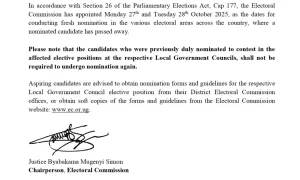The Ministry of Finance, Planning and Economic Development will today launch the National Budget Month 2024/2025 to give context around the Shs 72 trillion budget for the next financial year.
The Budget Month events are part of the ministry’s compliance with the Public Finance Management Act and accompanying regulations related to transparency and public inclusion in the budget process. At the same event, which comes 9 days before the Budget Day, the Open Budget Survey results for 2023/24 will also be released.
The main objective of Budget Month activities is to create awareness about government priorities and strategies for the FY 2024/25 and also provide accountability to the citizens on the key achievements for the current financial year.
It came as a surprise last month when parliament passed a record Shs 72 trillion budget, not only for its huge figure, but the big jump of about Shs 20 trillion from the FY 2023/2024 budget, with the main question being what the source of revenue would be.
It comes as the country is finding it harder to raise revenues especially as external budget support in terms of grants as well as soft loans dwindle, a fact admitted by the minister. Domestic revenues are expected to raise Shs 32 trillion, with the Uganda Revenue Authority (URA) tasked to raise Shs 31.5 trillion, an increase of Shs 19 trillion from the current target.
This target is considered unachievable by many, including several members of parliament. URA has a history over the last several years of not hitting its target, save for FY 2022/23 when it exceeded it by Shs 57 billion. This was attributed to the low target set due to the expected effects of the COVID-19 pandemic, which surprisingly were not as hash as expected.
The Shs 14 trillion increase from the initial budget proposal of Shs 58.34 trillion was largely driven by the ministry’s debt to the Bank of Uganda worth Shs 7.8 trillion which has to be cleared if the ministry is to avoid sanctions by the International Monetary Fund and the World Bank.
The budget comprises recurrent expenditure of Shs 18.9 trillion and development expenditure of Shs 34.7 trillion. Apart from tax revenues, the budget is expected to be funded by non-tax revenues of about Shs 800 billion, domestic borrowing of Shs 8.9 trillion, project support worth Shs 9.5 trillion and domestic debt refinancing of Shs 19.8 trillion and budget support (grants and loans) equal to Shs 1.3 trillion.
A total Shs 3.1 trillion is planned for external debt repayment, and Shs 9.5 trillion for project support, while Shs 12 trillion will for towards domestic refinancing. Interest payment on loans is expected to take Shs 9 trillion while Shs 9.1 trillion will go to repaying domestic debt under the Bank of Uganda, while the Bank will also get Shs 603 billion for recapitalisation.
Other expenditures include Shs 293.9 billion for appropriation in aid. Permanent secretary and secretary to the treasury, Ramathan Ggoobi insisted that the debt to the Bank of Uganda will not be paid by a loan.
He explains that the money is part of the additional Shs 13.8 trillion that was responsible for increasing the budget to Shs 72.1 trillion from the original Shs 58 trillion.

























